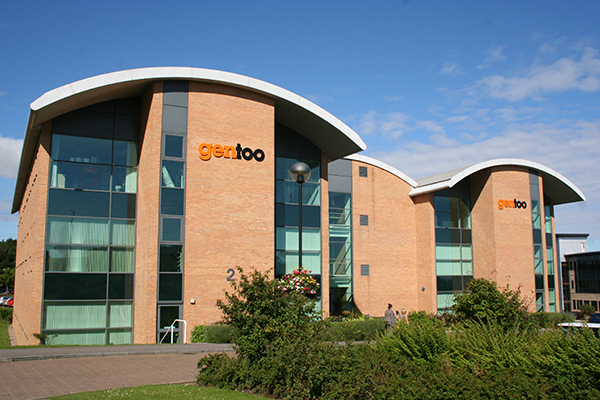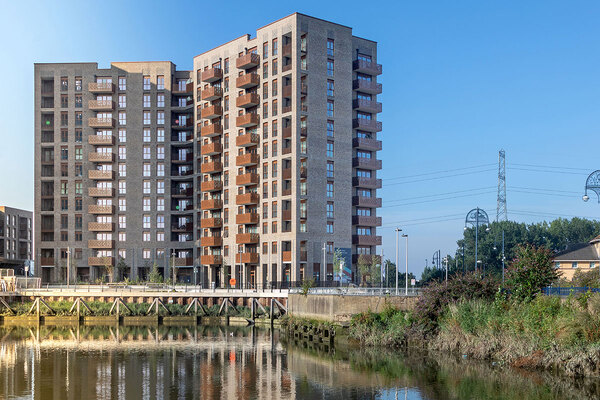You are viewing 1 of your 1 free articles
Gentoo: a Sunderland story
Following a turbulent three years, Pete Apps looks back at the recent history of Sunderland’s largest housing association. Photography by Alamy
In 2001, Sunderland Council became the latest town hall to sell its council housing stock to a housing association. Its 36,356 council homes were sold to the newly formed Sunderland Housing Group for £219.8m. This was, and remains, the biggest handover of homes from a council to an association the country had ever seen.
Seventeen years later, that housing association now goes by the name of Gentoo. It has just endured a turbulent three years, which culminated in a damning regulatory judgement in October last year, which made it non-compliant over pay-offs to departing executives, with the regulator accusing it of a governance failure “at the most basic level”.
The judgement also revealed that a “substantial number of properties” owned by the landlord failed to meet the Decent Homes Standard – the basic standard for quality in English social housing. And this came at the end of a tumultuous two years during which it had overhauled its business, lost its long-standing and charismatic chief executive Peter Walls, and made 330 staff redundant.
Inside Housing investigates the story of Gentoo, looking at how it reached this point and where it will go next.
When we speak to people in the city, it does not appear the stock transfer idea was unpopular at the turn of the millennium. The old repairs service had a bad reputation and the promise of investment was welcome. At that time, Mr Walls was director of housing at Sunderland Council on a salary of around £70,000. When he was made chief executive of the new housing association, his pay almost doubled to around £135,000. He later defended this, saying it made sense within the pay structure of the new business.
Undoubtedly, there have been successes. Gentoo has channelled more than £1bn into Sunderland’s council homes, improving many and regenerating some once-difficult areas. It has built more than 2,300 new homes. But there has also been controversy.
The first major job of the new association was a programme of demolition, which formed part of the transfer plans and remains controversial in the city to this day. In total, 3,898 homes were demolished, selected due to “social economic issues, high void levels and low demand”.
This programme sparked rows with homeowners who did not want to sell. There was also some bad feeling about the reason certain parts of estates were coming down; some locals believed places thought to have difficult tenants were targeted. And with no plans for replacement, large wastelands were created in the middle of estates dotted around the city.
In areas such as High Ford, demolished in 2003, new building finally got underway in 2015 and will complete in March this year. Driving around the estate now, it looks like a glossy brochure with its intermixed private and social properties, large drives, family-sized homes and gardens.
But in Palmerston Road, where an estate was cut in half by demolitions in 2003, a busy estate of large, red brick inter-war social housing suddenly gives way to an eerie empty plain. When Inside Housing visits in January, it is covered with an inch of snow. But locals say it is also used for fly-tipping and anti-social behaviour. Gentoo’s latest plans are to develop 500 homes there in 2019.
Gentoo’s office
After the controversy over the demolitions, Sunderland Housing Group rebranded as Gentoo in 2007.
This odd decision to name the organisation after a penguin coincided with a growth in Gentoo’s ambitions. It began to reach for a higher purpose than managing, and sometimes demolishing, council homes. It started describing itself as a “people, planet and property business” with an official vision “to improve the Art of Living beyond our imagination”.
In pursuit of this, the association branched out from housing management into other areas. By early 2015, its complex structure comprised of 15 companies – including a construction firm, a solar panel manufacturer, a firm that sold mortgage-free homes and an external cladding company.
But this expansionism did not breed financial success. In 2014/15, these companies booked a combined £2.7m loss, subsidised in effect from the social housing rents collected by Gentoo. This drew the ire of the regulator, which downgraded Gentoo in January 2015, with a warning about its governance.
Gentoo called in the consultants and began to review its operations.
Then in July of that year, the housing sector got a nasty surprise from government. The decision that social rents would go down by 1% came out of the blue for everyone and forced some difficult decisions.
But it quickly became clear Gentoo would be among the worst affected. A month later it warned redundancies were inevitable. In total, it laid off 330 staff from its core group. A further 69 followed when it sold its construction arm to Tolent. It sold Romag – a manufacturer of specialist glass for solar panels, which was already in trouble when Gentoo bought it in 2011 – for an estimated £3.8m loss. Astley Facades, a cladding manufacturer, had already been sold in March for £200,000.
Gentoo homes in the High Ford area
It also closed its once-vaunted scheme to sell homes without mortgages, Gentoo Genie, citing “financial pressures”.
In September 2015, chief executive Mr Walls resigned after 14 years in charge. As of March that year, he commanded a salary of £241,000 – having received a 5.7% pay rise that made him the eighth-best-paid association chief executive in the country.
The redundancy process continued, with staff at all levels of the business making way. It was during this process that the severance package that so annoyed the regulator occurred. This is tricky to report. Inside Housing has heard a similar account of the story, and several sources familiar with Gentoo have given us the same name of the executive who received the cash. However, as neither the regulator nor Gentoo will confirm these details, we cannot reveal the name at this stage. Until we can, no one should assume that just because someone is an outgoing Gentoo executive this relates to them; the name will become public when proceedings are issued.
What is known is this: the regulator’s ire is understood to relate to a single settlement. This settlement was made without the official approval of Gentoo’s board. Gentoo’s 2016/17 accounts show that its highest-paid member of staff received at least £400,000 that year, and £660,000 the year before. Asked if the settlement was split across financial years, it said “in some cases [exit payments] have been accrued over more than one financial year”, raising the possibility that the settlement which irked the regulator included both of these figures.
It is understood not to have been Mr Walls who got the money, or John Craggs, his long-standing deputy who replaced him as chief executive.
Gentoo has “proactively met” with Northumbria Police to discuss the matter; the police say they are “aware of the issues that have been raised”.
Palmerston Road, where an estate was cut in half by demolitions in 2003
The organisation is also engaged in its formal pre-action steps of a civil claim to recoup the money. Following the revelations, Mr Craggs – who like Mr Walls had been with the organisation since its inception – resigned with immediate effect. Keith Loraine, a former chief executive of Isos Housing with many years of experience in the sector, was made chair of Gentoo in September 2017. The organisation looked to a new start.
The first job would be fixing the homes that had slipped below the Decent Homes Standard. When Inside Housing speaks to tenants in Sunderland, it appears the main concern is the presence of single-glazed windows in a city that experiences particularly cold winters. A Gentoo spokesperson says its board has “agreed to accelerate” a window replacement programme as a result.
But the breaches of the Decent Homes Standard were more specific, explains Graham Gowland, executive director of property at Gentoo. A stock condition survey carried out by Savills in March last year identified 2,545 properties which didn’t meet the standard – one in every 12 of Gentoo’s homes. Mr Gowland explains that this was “largely because of gable walls… due to the age of the properties and environmental factors such as being situated in a coastal city”.
Gable walls – the triangular sections of walls under roofs – are particularly affected by wind. “At the end of December, 1,696 homes (5.8%) were outstanding,” Mr Gowland adds. He says this work will be completed by summer, and has not posed health and safety issues for tenants. Getting this right is the first step in rebuilding Gentoo’s reputation from the events of the past three years.
“The perception locally is that Gentoo is a good manager of houses,” says Michael Dixon, a Conservative councillor who has clashed occasionally with the landlord over the years. “So the report about the Decent Homes Standard surprised me. There has been some frustration about the demolitions. But the salaries of the highest earners within the organisation have, over the years, caused a bit of concern locally.”
There is little more damaging to the reputation of a charitable sector than this. As Gentoo seeks to rebuild its people, planet and property dream, this is a cautionary tail others would do well to keep in mind.
Inside Housing Spotlight
Inside Housing Spotlight is a series of pieces showcasing the best of our investigative and data journalism.
Spotlight pieces:
14 December 2018: Starting to bite - how Universal Credit is making people homeless: we reveal new figures showing a clear link between Universal Credit and homelessness
9 November 2018: First Priority - the inside story of a housing association which almost went bust When a small supported housing provider entered into a series of leasing deals with investment funds, it nearly spelled disaster for its vulnerable tenants. We investigate why.
12 October 2018: The ballad of Knowsley Housing Trust the inside story of the first housing association made non-compliant by the sector's watchdog for fire safety issues
13 September 2018: How tweaked building guidance led to combustible insulation on high rises: an investigation shows how lobbyists from the plastic insulation industry supported a quiet tweak to building guidance to permit combustible insulation on tall buildings
31 August 2018: The true cost of homelessness Freedom of Information requests reveal the soaring costs of temporary accommodation
30 August 2018: The forgotten threat to high rise tenants We investigate the threat posed by combustible window panels on social housing high rises
13 June 2018: The Biggest Ever Survey of Fire Risk Assessments Data journalism revealing widespread fire safety issues in more than 1,500 tower blocks across the country
12 April 2018: A Section 106 Story An investigation into allegations of "sham transactions" involving Section 106 deals in south London
23 March 2018: The Paper Trail: The Failure of Building Regulations A lengthy investigation into the failures of building regulation that may have contributed to the Grenfell Tower disaster, and the many missed warnings
23 February 2018: The Kingspan Papers Leaked meeting notes reveal some worrying issues, including allegations of fire safety report doctoring by manufacturers
9 February 2018: Gentoo: a Sunderland story We look back at the recent history of Sunderland’s largest housing association.
25 January 2018: Homeless families face long stays in council-owned hostels we reveal how councils in London are skirting the law by using hostels to house people in temporary accommodation for more than six weeks
7 December 2017: Council house to private rent We reveal the percentage of former Right to Buy homes in the private rented sector has passed 40%
17 November 2017: Rent to buy, or rent to rent? A look at how successful the government's Rent to Buy schemes have been
7 September 2017: Once upon a time in the west The history of KCTMO in the years before the Grenfell Tower fire
11 August: 2017 Grenfell: The paper trail - our news editor Pete Apps examines seven years of council documents to tell a story of the missed opportunites to prevent the Grenfell tragedy
4 August 2017 : Knowing the risks – the most common fire safety problems in tower blocks
26 May 2017: Rents hiked for RTB replacements – Sophie Barnes reveals less than half of Right to Buy replacement homes are for social rent
12 May 2017: A stark warning – a prescient piece looking at lessons to be learned from the Shepherds Bush tower block fire
13 April 2017: Where the axe will fall – a look at plans to axe housing benefit for younger people
10 Feb 2017: Circle of Despair – the inside story of Circle's repairs and maintenance troubles
3 Feb 2017: The Benefit Cap Tightrope – Sophie Barnes unveils the first exclusive analysis of the lower benefit cap


















